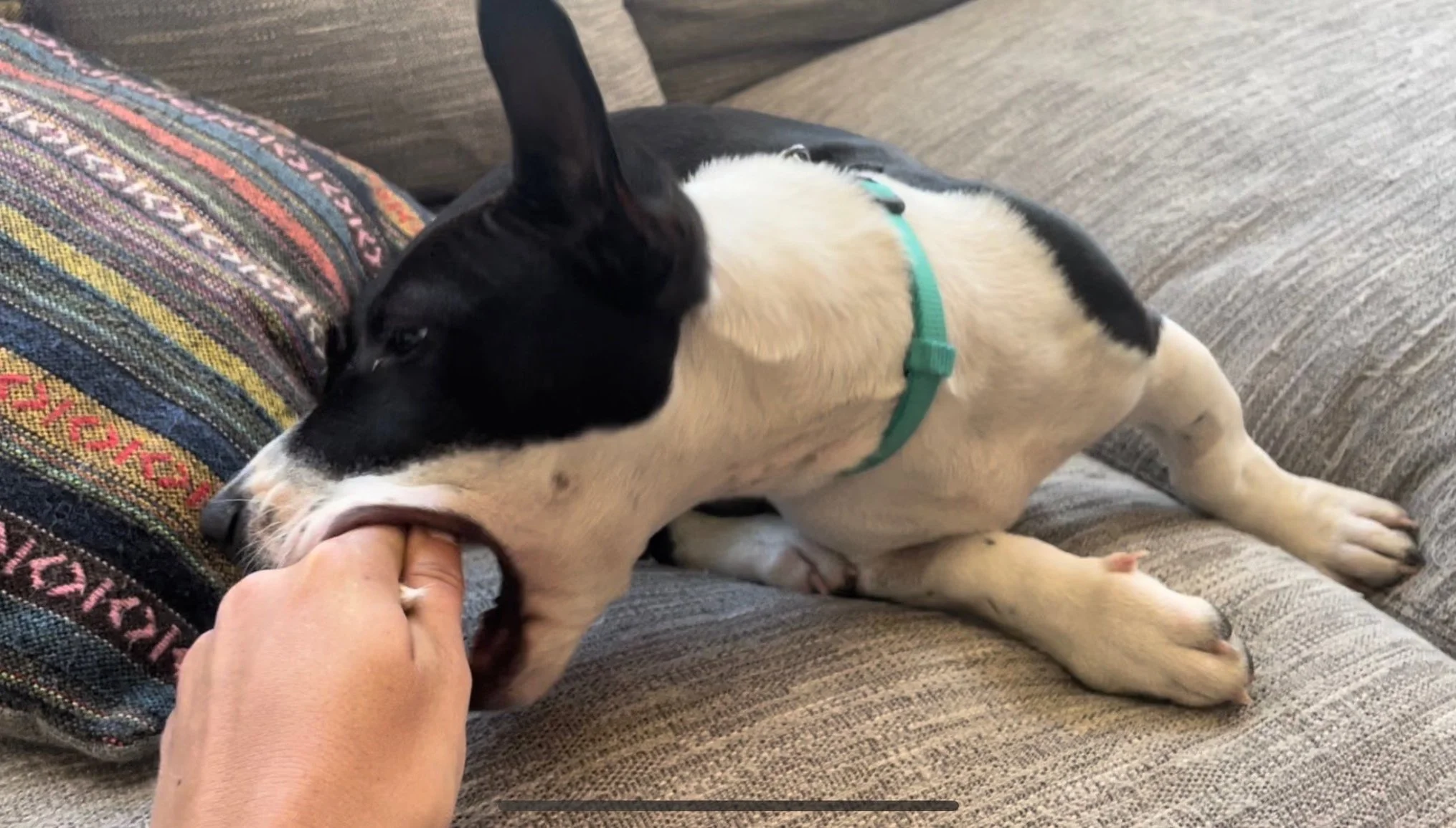Lions, Tigers, and Puppies?! Oh My!
Most of us have only thought of puppies as sweet, soft, yummy smelling bundles of happiness. And, they are… mostly. What is not as often discussed is that, with those sharp puppy teeth, it can feel like living with little piranhas, or alligators, or lions and tigers!
Mouthing. Biting. Nipping. Attacking. These are some of the words people have shared with me to describe their interactions with their pup. Although the puppy is “just playing”, it’s not the way most of us want to play with our dogs.
Dogs aren’t born understanding that we humans, with soft, tender skin, don’t want to play the way dogs play with each other. We need to help our dogs understand that we play differently. There are a few ways to help our dogs make adjustments for us humans.
1. Recognize that your puppy has a need to use her mouth. We recognize it in human babies, and refer to it as “teething”. It is much the same with canines, with the added incentive that it is normal, and many times, healthy play for dogs to use their mouths on each other. Puppies can be expected to be, at least occasionally, mouthy until the age of about 5 months. Of course, this can vary between dog to dog with some discontinuing the behavior earlier and some taking a bit longer.
2. Calmly tell her that biting you isn’t going to work for her. When she bites, in a calm, deep tone of voice, tell her “uh uh”. (Channel your mom’s disappointed tone of voice.) No yelling, no hitting– those methods can backfire on us and just create a dog who is afraid of us. We want her to understand, and hear us, that the behavior of biting doesn’t work in her interactions with you.
If you are petting her at the time that she puts her teeth on you, stop petting her as you say “uh uh”,
If you are playing with her at the time that she puts her teeth on you, stop playing with her as you say “uh uh”, then–
3. Show your pup where she can use her mouth. When she wants to use her mouth, offer her a toy. Engage in play with her by holding the end of the toy and encouraging her to “get it” by wiggling the toy so she can chase and bite at the end of the toy. When she does, praise her (“good girl!”) so she can practice biting the toy as she plays with you, and learns how to play with you.
4. Sometimes it is helpful to give your puppy time to play like a dog. When she can play with other dogs, wrestling and using her mouth in healthy dog to dog play, she will have that need met and be less likely to want to play with you in that same manner.
5. Give your dog something to do with her mouth. Although you may have plenty of toys around the house for your dog, rotate the toys so that you always have a stash of old toys in the closet and, every few days, you can bring out an old, new toy and put a different toy in the closet, to be brought out later as new. In addition, consider feeding your pup in food puzzle toys. Toys she has to chew and work at to get her food. Feeding in a bowl is a wasted opportunity. When we feed our dogs in toys in which they have to work to get the food, we tire their minds, their bodies AND their mouth. Take a look here for ideas.
6. You’ve tried all this and your pup will still use their mouth on you?! Sometimes, we’re in the mood for petting and snuggling and our pup is in the mood for play. If you want to pet your pup and she continues to bite in play, you might just need to recognize that petting is out for the moment. Grab a toy and play! OR, like human toddlers, sometimes our puppies get unruly when they are simply tired and need some down time. Look back on your pup’s day. Has it been a long, fulfilling day with plenty of exercise and new experiences? Then, consider that your pup’s mouthing is telling you that she’s tired. Or, has it been a boring day and, legitimately, your pup hasn’t had an outlet for her mind or her body? Then, take her for a walk, or some training time.
Think of your pup’s mouthiness as communication to you. Right now, that’s her best way to tell you what she needs. Be a good detective and consider what her need may be, right then:
Play time? (And, learning how to play with humans)
Need for exercise?
Need a safe bone or puzzle toy to independently work on?
Need for a nap?
Or, maybe an adjusted daily routine that includes new experiences, play time, training time, food puzzle toys, and naps
If you are still struggling, we can help. We offer private training specifically for puppies through our Well-Rounded Puppy Program as well as group classes for dogs over the age of four months.
Young puppies have a physical need to use their mouth. That doesn’t mean that we should just wait it out and hope they outgrow it. Teach your pup when and how to use her mouth. And, it’s ok to ask for help when you need it – we’re here for you both.

